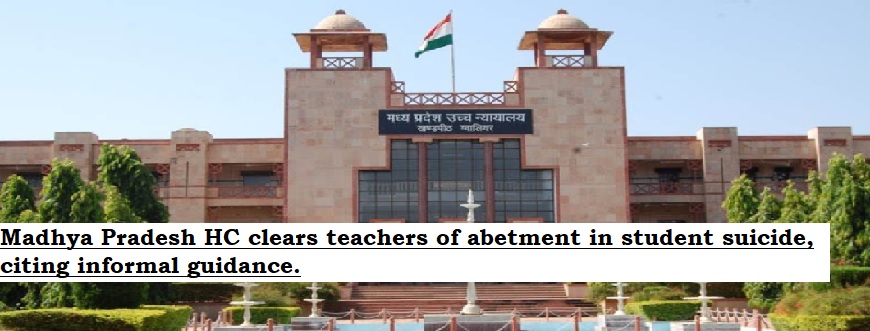


The Madhya Pradesh High Court recently rendered a significant judgment, asserting that the act of a teacher reprimanding a student, aimed at course correction, should not be construed as abetment to suicide under Section 306 of the Indian Penal Code (IPC). The court's ruling also underscored the distinction between informal social controls employed for guiding students and the legal definition of abetment.
In its detailed reasoning, the court highlighted that the informal social controls, derived from various sociological theories, should not be universally applicable but are essential for the betterment of children. The court specifically addressed a case where parents were called for counseling, emphasizing that such measures do not amount to abetment. The court articulated that the instigation, for it to be considered, must be active and proximate to the incident in question, a criterion that was found lacking in the factual scenario of the case.
Sitting at Gwalior, the bench opined on the role of school authorities, particularly the Principal and teachers, in maintaining discipline and a peaceful atmosphere within the premises. The court acknowledged the necessity of informal social controls to deter students from engaging in detrimental behaviors that may hinder their overall growth. It commended the teachers in this case for adopting appropriate measures to correct the wrongdoing, asserting that their intention was not to drive the deceased student to commit suicide.
The case involved three teachers, including the Principal and Vice-Principal of Vivekanand Higher Secondary School, Tekanpur, who were accused under Sections 306 and 34 of the IPC. The charges stemmed from the suicide of a Class XII student after being reprimanded by school authorities for bursting crackers in the school washroom. The court highlighted the sequence of events, where the erring students were taken to the Principal's office, and their parents were called to address the misconduct.
The prosecution argued that the psychological pressure exerted on the deceased student through reprimanding and scolding led to his suicide. However, the court scrutinized the prosecution's case, emphasizing that teachers are expected to correct students' wrongdoings and ensure the well-being of other students. The judges pointed out that informal social controls, such as scolding or praising, fall within the scope of the teachers' responsibility in mentoring students.
In allowing the plea by the teachers, the court delved into the nature of informal social controls, categorizing them into private, parochial, and public social controls. It discussed the various tools, including social support, non-verbal cues, and peer feedback, that constitute informal social controls. The court identified these mechanisms as crucial for keeping individuals in check without relying solely on legal measures.
Furthermore, the court recognized that with the ban on corporal punishment, teachers need alternative means to correct deviant behavior. It emphasized that if a student, out of curiosity, ignorance, or peer pressure, engages in deviant behavior, measured reprimand or scolding becomes necessary. The court applied this reasoning to the present case, noting that while three students were reprimanded, only the deceased student appeared overly sensitive and subsequently took a drastic and painful decision.,
In conclusion, the Madhya Pradesh High Court's ruling provides clarity on the scope of teachers' actions in course correction and the applicability of informal social controls. It reinforces the responsibility of educators to guide students while recognizing the challenges in dealing with diverse sensitivities. The court's nuanced approach encourages a balanced perspective on disciplining students and underscores the importance of maintaining a positive and nurturing educational environment.
TAGS: Madhya Pradesh High Court Abetment to suicide Section 306 IPC Informal social controls Course correction Teacher's role